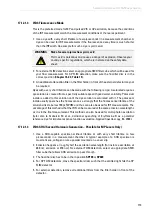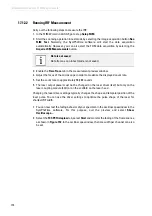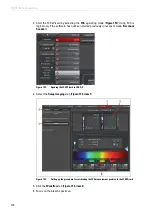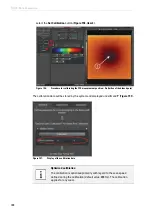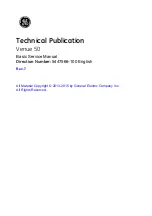
177
F(L)CS Data Acquisition
18
F(L)CS Data Acquisition
With the TCS SP8 SMD, you can carry out point measurements and FCS and FLCS data
acquisitions are possible.
With sensitive detectors such as APDs, FCS measurements can be carried out. In all point
measurements, the fluorescence is recorded at a certain position in the specimen and
analyzed in the SymPhoTime software.
If no pulsed lasers are attached to the system or if lifetime information is not needed,
continuous wave lasers from TCS SP8 can be used for the fluorescence excitation.
18.1
Preparing the FCS Measurement
This chapter includes steps that are helpful in preparing for an FCS measurement, not the
description of the FCS measurement itself. That information can be found in
to
18.1.1
Selecting an Objective
• Select a suitable objective: Since with FCS variations the focus size and shape have a
particularly significant impact, we recommend using water immersion objectives for in
vitro assays and in vivo experiments.
• For good FCS results, adjust the cover slip thickness with the correction ring (if available
with the objective used).
• Select an objective with a high numerical aperture in order to maintain the smallest
possible observation volume and yet to collect as many emitting photons as possible.
We recommend the water immersion objective
HCX PL APO 63x/1.2W CORR CS
0.14 to 0.18
with manual or motorized correction ring. This objective functions
exclusively with specimen slides or (glass-bottomed) measurement chambers that are
140
μ
m to 180
μ
m thick (e.g. cover slip types #1.0 or #1.5).
18.1.2
Calibrating the Positioning Accuracy of the FCS Measuring Point
The measuring point is positioned via the scanner. Positioning accuracy can be optimized
using a calibration function. Repeat this procedure about every 3 days. If you determine that
the system is stable, you can also increase the time between fine-tuning sessions.
Use a bleach specimen with fixed fluorescence that is capable of being excited with a
wavelength in the visible range and can also be photobleached with higher laser intensity.
The bleach specimen may be a chroma slide (fluorescent dye that has been allowed to dry
onto a cover slip), or you can mark the top side of a cover slip with a fluorescent marker.
1. Switch the confocal system on and start the LAS AF software as described in the
instructions in
. Select the conventional mode.
2. Activate the lasers in the
Configuration
step,
Lasers
button. Set the
Gain
for the argon
laser to a value between 20 and 30 %.
Summary of Contents for TCS SP8 SMD
Page 1: ...10 Living up to Life User Manual Leica TCS SP8 SMD for FCS FLIM and FLCS ...
Page 4: ...4 Copyright ...
Page 14: ...14 Contents ...
Page 18: ...18 Intended Use ...
Page 20: ...20 Liability and Warranty ...
Page 28: ...28 General Safety Notes ...
Page 32: ...32 Additional Notes on Handling the System ...
Page 44: ...44 System Overview and Properties ...
Page 60: ...60 SMD Components Figure 31 DSN 102 Dual SPAD Power Supply ...
Page 80: ...80 Safety Features ...
Page 102: ...102 Switching On the System ...
Page 116: ...116 LAS AF ...
Page 214: ...214 Changing the Specimen ...
Page 216: ...216 Changing the Objective ...
Page 238: ...238 Switching Off the System ...
Page 242: ...242 Repairs and Service Work ...
Page 244: ...244 Maintenance ...
Page 246: ...246 Disassembly and Transport ...
Page 248: ...248 Disposal ...
Page 254: ...254 Contact ...
Page 256: ...256 Recommended Literature ...
Page 266: ...266 Appendix Figure 225 Declaration of conformity ...
Page 268: ...268 Appendix ...
Page 269: ......











